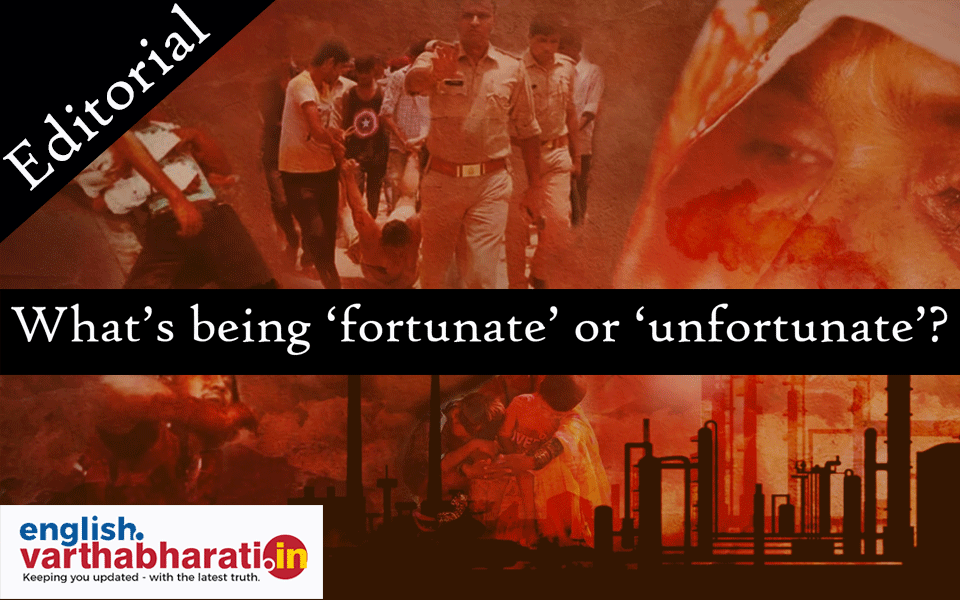Usually words such as loss, tragic or unfortunate are used to express feelings when accidents or mishaps or natural disasters occur. May be even to describe when hundreds of people die in a train or bus accidents or something. But if the leaders of the nation use such words, it indicates things that happened were due to evil forces or something similar. Can a leader escape his responsibility by using that word?
Finally, and thankfully so, the PM has broken his silence on incidents of lynch mobs having claimed lives of 12 people in the country. All he has said is ‘it’s unfortunate’. Whose bad fortune was that? Of the PM, or the nation or that of the dead ones? He hasn’t made that clear in his speech.
Instead of speaking strongly against those people in lynch mobs who incited the hatred and caused the deaths, he has spoken against political parties that have been criticizing such incidents and blaming the government for it. He has called the political parties vested interests for wanting action against lynch mobs. And there is a reason and a pattern to his response. Instead of issuing a stern warning to attackers, he has ridiculed the parties that have spoken against this.
One does not understand whether mob violence increases owing to fortune or misfortune. But when the law implementation is done effectively, and the agencies work with due diligence, instances of crime and violence comes down.
When the whole system is weak, the unruly mobs go on a rampage. The police department works according to the stance government adopts against particular issues. Because, after all, the police department is part of the government itself!
Ever since Modi govt came to power, the rate of crime has increased in the country. UP government would soon be issuing lynch mobs an Id card and circumvent the democratic ideals the governments should work on. When this happens, how does one assume the incidents are merely ‘unfortunate’?
One can understand the govt pandering to these mobs, when you see how many members of the mobs have been arrested or being acted against. And this will explain why the incidents are on a rise in India. Who are they who get violent in groups? Are they common people who turn into flash mobs and get violent at the spur of the moment?
The PM surely knows they are not commoners. One clearly knows the party that brings pressure to let off the violent group member when they are arrested by cops. Cops killed a cow trader in Udupi and threw his body in a tribal settlement. Then they pretended to trace the body and said he had died of heart attack. After there was a widespread demand to investigate the death, the accused people and cops were held. The local goons who belong to Sangh Parivar were main accused in the case. Immediately after they were held, BJP MP and leader Shobha Karandlaje took to streets demanding for the release of these Sangh Parivar members. Does this not indicate that the mobs and party politics are hand in glove?
On one hand Modi says these lynch mobs are unfortunate. On the other, their own party members are defending these crimes. Who should be trusted? Another incident occurred in Jharkhand some time ago. People beat up a cow trader and cops arrested them. Eventually the culprits were released on bail and Union minister Jayant Sinha accorded them honour by garlanding them. One cannot dismiss this as ‘unfortunate’ and maintain silence. This is an encouragement to those who lynch. The minister should have been criticized or at least told some words of advice to not engage with such elements.
The word ‘unfortunate’ should have been used against incidents such as this one. But the PM chose not to speak at that time. Many instances are such that even cops are hand in glove with the culprits. The government has sponsored such acts by being party to it in some sense. Since BJP is the beneficiary of this violence, the country is indeed going through an unfortunate time.
Let the Truth be known. If you read VB and like VB, please be a VB Supporter and Help us deliver the Truth to one and all.
Kalaburagi: Four men have been arrested in Kalaburagi on charge of hacking a man with lethal weapons and pelting stones at him under the limits of Station Bazaar Police Station recently.
According to police sources, Anand Jalak Shinde (34), Ashitosh Jalak Shinde (30), Imran Mehboob Sheikh (28) and Sohaib Anwar Qureshi have been arrested. The men are accused of the brutal murder of Syed Mehboob, a resident of Station Bazaar Upper Line Hamalawadi in the city.
An FIR was filed by the Station Bazaar Police Station based on a complaint given by Syed Ismail, father of the deceased Syed Mehboob.
Following quick probe, the police team successfully arrested the suspects within 24 hours. The arrested men were produced in court and have been sent to judicial custody.
The City Police Commissionerate has appreciated in an official release the police team’s quick solving of the murder case and arrest of the four men accused of murdering Syed Mehboob.





